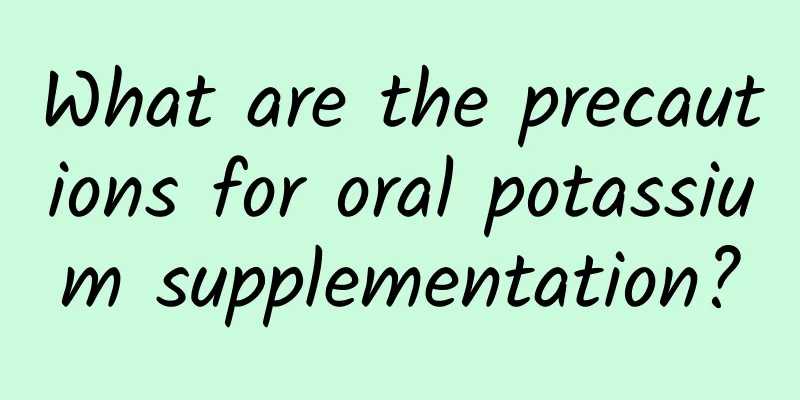What are the precautions for oral potassium supplementation?

|
In addition to taking potassium from food, you can also take potassium through oral liquids. There are some issues to pay attention to when taking potassium orally, such as how much potassium to take every day. If too much potassium is taken in every day, it will cause certain harm to the human body. There are many issues that need attention. What are the precautions for oral potassium supplementation? Let’s take a look at it next. 1. Oral potassium supplementation The human body relies entirely on external intake of potassium. The daily intake of potassium from food is about 50-100mmol, and 90% is absorbed by the small intestine. The kidneys are the main organs for excreting potassium and regulating potassium balance. The potassium in the glomerular filtrate is first completely absorbed in the proximal renal tubules, and then the distal renal tubular cells and collecting duct cells secrete the excess potassium and excrete it in the urine, thus maintaining potassium balance in the body. However, when the human body does not take in enough potassium, the kidneys cannot significantly reduce potassium excretion, causing potassium to be retained in the body, which can easily cause potassium deficiency. 2. Precautions for potassium supplementation Potassium supplementation should only be considered when the urine volume is above 30 ml/h, otherwise it may cause hyperkalemia. For patients with acidosis, hyperchloremia or liver damage, potassium glutamate can be considered. Each 6.3g vial contains 34mmol of potassium and can be added to 0.5L of glucose solution for intravenous drip. Too high a concentration of potassium chloride in an intravenous drip can irritate the veins and cause pain, or even venous spasm and thrombosis. 3. What to eat to supplement potassium Cereals: whole grains, wheat sprouts. Milk: all kinds of flavored milk. Meat: Goose, sardines, poultry, fish and lean meat are also high in potassium. Beans: red beans, mung beans, soybeans, black beans, broad beans. Vegetables: Dark vegetables (especially high in red amaranth, green amaranth, and water spinach), as well as seaweed, carrots, shiitake mushrooms, broccoli, spinach, kelp, potatoes, etc. Fruits: Bananas, tomatoes, persimmons, apples, longans, cantaloupe, dates, oranges, and mangoes have the highest content. Citrus, apples, apricots, cantaloupe, cherries, papaya, and grapes also contain high levels of potassium. Others: chocolate, cocoa, peanuts, Yakult, baked sweet potatoes, pumpkin, dried apricots, prunes, raisins, nuts, especially hazelnuts, cashews, pumpkin seeds, sunflower seeds and canned pickled products. Orange juice and unsalted soy sauce are also high in potassium. |
<<: Waking up with back pain every morning
>>: How to cure obsessive-compulsive disorder
Recommend
What are the symptoms of bacillary dysentery?
Bacillary dysentery is a relatively rare infectiou...
Does Sphenoid Sinusitis Require Surgery?
Colds are a common disease among us, but other di...
How to decoct frankincense and myrrh
Frankincense and myrrh are usually made by soakin...
27 Chinese medicines for autonomic nervous system disorders
Patients with autonomic nervous system disorders ...
What causes ankle pain?
If your ankle is bent and you experience soreness...
TCM treatment of liver disease
In today's developed society, medical technol...
With Sun Simiao's sleep method, you can throw away all the medicine
Sun Simiao, also known as the Medicine King Sun T...
What are the benefits of blood type 0?
O type blood is a relatively common blood type. O...
Is it good to eat Tianma for headache?
Gastrodia elata is a relatively common Chinese me...
How to relieve thigh pain during menstruation
Menstruation is a problem for almost every woman,...
How effective is the weight loss effect of soaking hawthorn and lotus leaves in water?
In modern society, losing weight is the most freq...
What causes nausea after eating in the morning?
Many people feel like vomiting when eating in the...
Can pregnant women eat fresh longan?
People must have eaten longan fruit in their live...
What is Saffron
Saffron is a special plant that can also be used ...
What to do if you have toothache during pregnancy
If you experience toothache when you are just pre...









